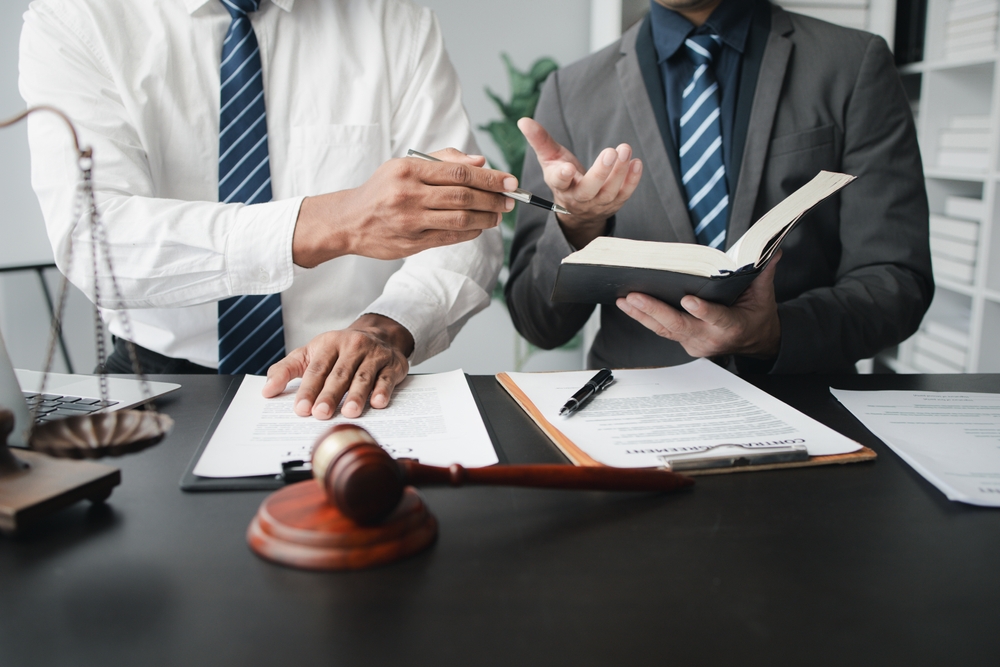Have you suffered injuries that were someone else’s fault? If so, you need and deserve the help of a personal injury lawyer.
Hiring a Hammond personal injury lawyer means having someone who understands the legal process and can protect your rights throughout it. Moreover, they will give you the freedom to focus on recovering from your injuries, not on carefully managing an unfamiliar and complex caseload.
What Can a Personal Injury Lawyer Do for Me That I Can’t Do on My Own?

File Legal Documents in Court
Personal injury lawyers know how to work within the court system, including the nuances of legal document preparation and submission. They can properly file all the paperwork, from the initial complaint to subsequent motions, adhere to strict court-mandated formats, and meet tight deadlines.
This process often involves developing detailed legal arguments and adhering closely to procedural rules, which require a deep understanding of legal principles and court requirements.
Conduct Formal Discovery
Lawyers handle the formal process of discovery, a critical phase in legal proceedings where they gather evidence from the opposing party. This often includes taking depositions, in which witnesses provide sworn testimony outside of court. It might also involve drafting and sending interrogatories (written questions that require written answers) and demanding relevant documents.
These activities require legal know-how to frame questions and requests effectively and to interpret the responses in a legal context.
Consult Expert Witnesses
Another key advantage a lawyer brings is their access to a network of expert witnesses. These professionals – such as medical doctors, accident reconstruction specialists, and economic analysts – provide reliable testimony that is often essential to proving who is at fault for an injury and the extent of the harm the victim suffered as a result.
Lawyers can identify the right experts and effectively integrate their testimony into your case strategy.
Understand and Apply Case Law
Lawyers bring a comprehensive understanding of case law, the law that previous court decisions have established, to your case. They conduct thorough research to find precedents that support your position, often with the use of complex (and expensive) legal databases and texts.
Case law matters because it allows attorneys to formulate legal strategies and can influence the outcome of your case – strategies that would not occur to the layperson.
Argue Legal Motions and Appeals
A personal injury lawyer can make a significant difference in the event of legal motions or appeals in your case. It takes a deep understanding of legal theory and court procedures to effectively file motions, which can range from motions to dismiss the case to motions for summary judgment.
Similarly, filing appeals involves complex legal writing and oral argument skills to persuade higher courts to overturn or modify lower courts’ decisions.
Cross-Examine Witnesses
Cross-examination is a skill that lawyers hone over years of practice. In court, attorneys use this technique to challenge the credibility and reliability of the opposing party’s witnesses.
This skill involves quick thinking, strategic questioning, and the ability to spot inconsistencies or weaknesses in testimony, all grounded in a firm understanding of both the law and human psychology.
Interpret Insurance Policies
Personal injury lawyers know how to decipher complex insurance policies. Understanding these documents takes more than just reading the text. It requires interpreting the implications of specific clauses, exclusions, and limits.
Lawyers use this knowledge to argue for maximum compensation under the policy, sometimes engaging in legal battles with insurers over policy interpretations.
Draft Settlement Agreements

This process requires legal oversight to ensure that the language in the agreement is legally binding and that it protects the client’s interests.
Negotiate Lien Reductions
Personal injury lawyers are adept in negotiating lien reductions with healthcare providers or insurers. Liens, which are claims by third parties to your settlement money, can significantly reduce the net amount you receive.
Lawyers can use their negotiation skills and legal knowledge to argue for a reduction of these liens, often working with complex legal and contractual principles to do so.
When Should I Contact a Personal Injury Lawyer after an Injury Accident?
You might feel overwhelmed and unsure about what to do after a sudden accident. The decisions you make now can significantly influence any legal claims you file later, so professional guidance matters. This is why you should contact a lawyer as soon as possible after an accident.
First and foremost, quickly calling a lawyer protects your legal rights. Insurance companies often reach out to injury victims soon after an accident. They might ask you to provide a statement or trick you into accepting fault. You should always have a lawyer on your side before you talk to them.
Alternatively, the insurance company might make you what seems like a tempting offer that could jeopardize your case. They’ll call and say that they’ve looked into the matter and have what they think is a fair settlement offer, hoping you are desperate enough to accept and release them from further liability. However, these initial offers are usually much lower than what you deserve.
A personal injury lawyer knows how to deal with these high-pressure insurance tactics. They can take over communication with insurance companies, relieving you of the pressure to respond and preventing you from settling for less than your claim is worth.
Another good reason to contact a lawyer immediately is that valuable evidence can disappear quickly. Physical evidence deteriorates, and witnesses’ memories become less clear over time.
A lawyer can act quickly to preserve this evidence. They might visit the incident scene, gather photos, talk to witnesses, and collect reports. This evidence is often foundational in building a strong case.
By hiring a personal injury lawyer, you gain peace of mind during a stressful, painful recovery process.
You can focus on your recovery while your lawyer handles your case’s legal aspects. They can manage the paperwork, negotiations, and deadlines, keeping your claim moving forward even as you rest and recuperate.
What Types of Cases Do Personal Injury Lawyers Handle?
Personal injury lawyers handle a wide range of cases, each with unique complexities and legal considerations.
These cases include:
- Car Accidents: Car accidents are among the leading causes of preventable injuries in the United States, and they are often the result of negligence on the part of another driver. Personal injury lawyers help victims recover compensation for medical expenses, lost income, and pain and suffering resulting from the accident. They handle insurance claims and, if necessary, take legal action against at-fault drivers or their insurers.
- Motorcycle Accidents: Motorcycle accident cases often involve serious injuries due to the exposed nature of motorcycles. Lawyers in these cases focus on proving the negligence of other drivers and demanding fair compensation for motorcyclists’ injuries, which are often more severe than those in typical car accidents. They also fight back if insurers try to stereotype bikers as reckless or thrill-seeking to avoid paying their claims.
- Truck Accidents: Truck accident cases are complex due to serious injuries and the involvement of multiple potentially liable parties, like trucking companies and cargo owners. To get their client every penny they deserve, personal injury lawyers work to establish liability, which can rest solely or partially with the driver, the trucking company, or even a truck manufacturer.
- Rideshare Accidents: Rideshare accidents involve vehicles operating under transportation network companies like Uber or Lyft. Lawyers must navigate the unique insurance issues relating to rideshare companies and work to secure compensation for affected parties.
- Bicycle Accidents: In bicycle accident cases, lawyers represent cyclists injured by negligent motorists. They advocate for cyclists’ rights and seek compensation for medical bills, lost income, and other harm resulting from the accident.
- Pedestrian Accidents: Pedestrian collisions can be especially devastating, as those on foot have nothing to protect them from the force of an impact by a motor vehicle. These cases often involve complex right-of-way and negligence issues.
- Construction Accidents: Construction accident cases involve injuries on construction sites, often due to safety violations or equipment failures. Personal injury lawyers help workers or bystanders who suffer harm in such accidents get compensation for their injuries, income losses, and more. In many cases, the injured parties may file workers’ compensation claims.
- Dog Bite Injuries: These cases involve injuries from dog attacks or bites. Dog bite lawyers seek compensation for their clients’ medical treatment, psychological trauma, and other damages, often from homeowners’ or renters’ insurance policies.
- Medical Malpractice: Medical malpractice cases arise when healthcare professionals fail to provide adequate care, resulting in harm to patients. Lawyers in these cases must prove negligence on the part of the healthcare provider, which has a much higher bar to clear than other negligence-based claims.
- Nursing Home Injuries: Personal injury lawyers can represent residents of care facilities who have suffered abuse or neglect at the hands of their caregivers. They hold responsible parties accountable and secure compensation for the residents’ physical, emotional, and financial injuries.
- Product Liability Incidents: Product liability cases involve injuries resulting from defective or dangerous products, including dangerous drugs. Personal injury lawyers work to prove that these products contain harmful flaws and seek compensation from manufacturers or retailers.
- Slip-and-Fall Accidents: Slip-and-fall cases involve injuries from falls due to unsafe conditions on someone else’s property. Personal injury lawyers must establish that an unsafe condition existed on the property, that the owner or occupier should have addressed it, and that their client suffered injuries as a result of the owner or occupier’s failure to do so.
How Do Personal Injury Lawyers Calculate Their Fees?

Here’s how it works. Typically, a personal injury lawyer will accept your case without charging you any up-front or out-of-pocket fees. Instead, they take an agreed-upon percentage of your final settlement or court award as their fee. The percentage is set on a sliding scale that increases based on the complexity of your case and how long it takes.
If the case is straightforward and settles quickly, the fee might be on the lower end. If it goes to trial, the fee might be higher due to the additional work your lawyer must do.
In addition to the contingency fee, there might be other costs to your case, such as court filing fees, costs for obtaining medical records, and fees for expert witnesses. Some lawyers might deduct these costs from the final settlement, while others require you to pay them as they arise.
Discuss all these details with your prospective lawyer so you understand exactly how they will handle your case financially.
Crucially, this fee arrangement aligns the lawyer’s interests with yours. Since the lawyer’s payment depends on the success of your case, they have every incentive to work hard and get the best possible outcome for you.
Also, because you don’t pay any upfront fees, you have access to high-quality legal representation even if you can’t afford to pay hourly legal fees.
How Do I Choose the Right Personal Injury Lawyer for My Case?
Choosing a lawyer isn’t just about finding legal representation. It’s about finding someone who understands your specific needs and addresses them accordingly.
The right lawyer increases your chances of a favorable outcome and provides the support you need during what is often a stressful and challenging time.
Here are some tips to keep in mind as you select a personal injury attorney:
- Ask for Recommendations: Talk to friends, family, or coworkers who have had personal injury cases and can provide firsthand insights.
- Check Credentials and Experience: Check every prospective lawyer’s experience in handling injury cases, especially those similar to yours.
- Ask About Their Fee Structure: Understand how the lawyer charges for their services, case costs, and unexpected expenses.
- Evaluate Communication Skills: Choose a lawyer who communicates clearly, listens well, and explains legal concepts in a way you understand.
- Check their Availability: Ensure the lawyer you choose has the time to address your concerns and give your case the attention it deserves.
- Trust Your Instincts: Choose a lawyer who makes you feel comfortable, confident in their abilities, and respected as a client.
